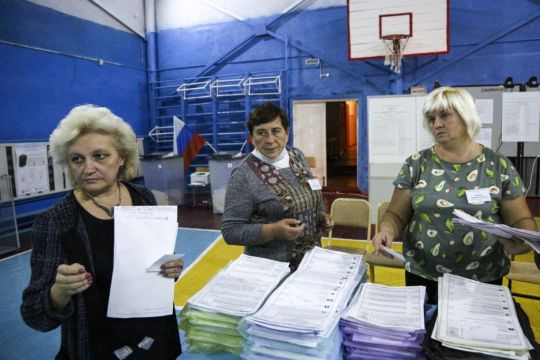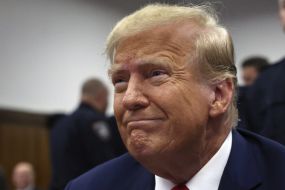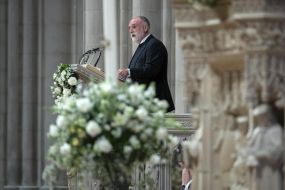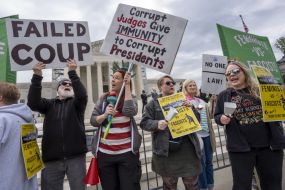Russia’s ruling party has retained its supermajority in parliament, cementing President Vladimir Putin’s grip on power in elections that most opposition politicians were barred from and that were marred by multiple reports of violations.
The vote has been watched closely for any signs that Mr Putin’s control might slip, however slightly, ahead of the 2024 presidential election.
It is not yet clear whether he will run again, choose a successor or outline a different path, but he is expected to keep his hand on the tiller whatever he decides, and an obedient State Duma, or parliament, will crucial to those plans.
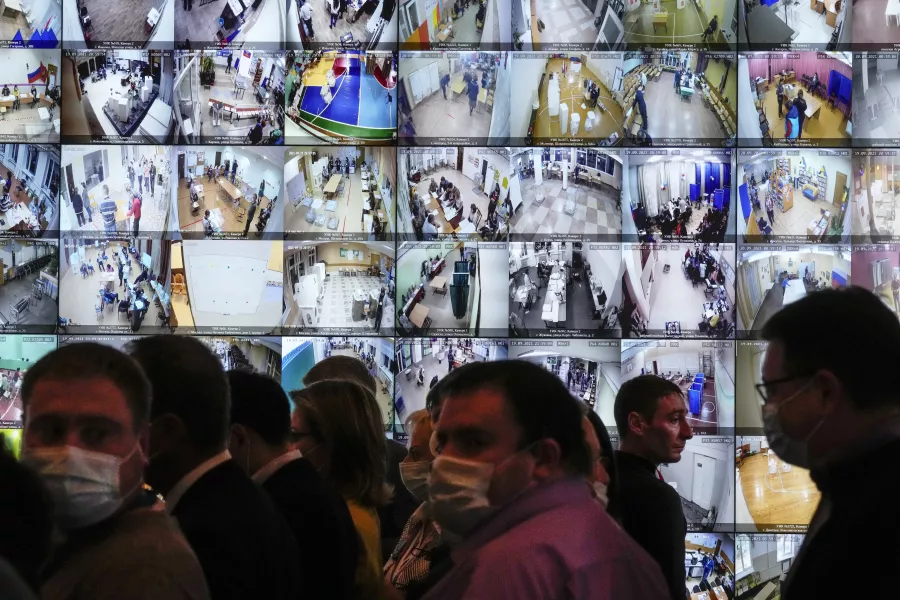
Results from nearly 99% of the country’s polling stations gave the ruling United Russia party 49.8% of the vote for the 225 seats apportioned by parties, according to the Central Election Commission.
Another 225 legislators are chosen directly by voters, and the results on Monday morning showed United Russia candidates leading in 198 of those races.
The head of the Central Election Commission, Ella Pamfilova, confirmed at a briefing that United Russia has retained the constitutional majority in the parliament, or two-thirds of the 450 seats required for a party to be allowed to make changes to the country’s constitution.
The results indicated there will be almost no opposition voices in the Duma, with three other parties that usually toe the Kremlin line set to take many of the remaining seats, along with the New People party, which was formed last year and is regarded by many as a Kremlin-sponsored project.
According to Ms Pamfilova, candidates from three other parties each won a seat, so eight political parties will be represented in the Duma. Voter turnout stood at 51.68%, she added.

The Communist Party received 19% of the party-list vote, a sizable improvement from the 13% it got in the last election in 2016.
United Russia got about 54% five years ago, so the results indicate some fall in support.
Claims that the results had been manipulated mounted on Monday, when the results of online voting in Moscow were still not available to the public. The results in the other six regions that were allowed to vote online have been released.
In Moscow, approval of the ruling party has always been particularly low and protest voting has been widespread, and Kremlin critics were calling for protests later in the day.
Mr Putin’s spokesman Dmitry Peskov said the Kremlin viewed the election “quite positively” in terms of its “competitiveness, transparency and fairness”.
Mr Putin himself thanked Russians “for the trust” and for “a proactive approach to life”, referring to the turnout, which was higher than in 2011.

The Kremlin sweep was widely expected since few opposition candidates were allowed to run this year after Russian authorities unleashed a sweeping crackdown on critics.
Organisations linked to imprisoned opposition leader Alexei Navalny have been declared extremist, and anyone associated with them was barred from seeking public office by a new law.
Mr Navalny is serving two and a half-year prison sentence for violating parole over a previous conviction he says was politically motivated.
Other prominent opposition politicians faced prosecution or were forced to leave the country under pressure from the authorities.
Mr Navalny’s team still hoped to make dents in United Russia’s dominance with their Smart Voting strategy, which promoted candidates who had the best chance at defeating those backed by the Kremlin. However, a massive effort by authorities to suppress the strategy has been under way in recent weeks.
The government blocked the Smart Voting website and pressured Apple and Google to remove an app featuring it from their Russian online stores — a move the tech giants took as voting began on Friday.
Google also denied access to two documents on its online service Google Docs that listed candidates endorsed by Smart Voting, and YouTube blocked similar videos.
In addition, the founder of the Russian messaging app Telegram, Pavel Durov, on Saturday disabled a Smart Voting chatbot set up by allies of Mr Navalny.
“As far as I understand, data from offline polling stations shows that candidates (endorsed by) Smart Voting won in 12 (single-constituency) districts out of 15, and in St Petersburg — in seven out of eight,” Mr Navalny said in a social media post relayed through his lawyers from prison.
“So the robot thought about it, lit a cigarette and decided to slow down the publication until the clever little hands of United Russia faked the results into completely opposite ones.”
